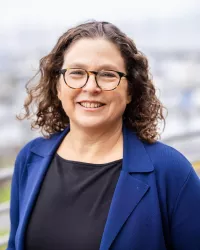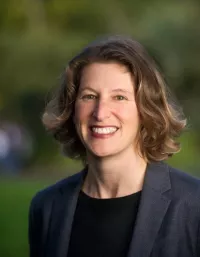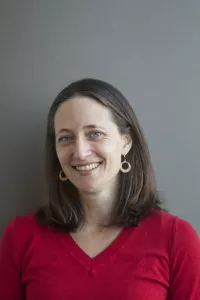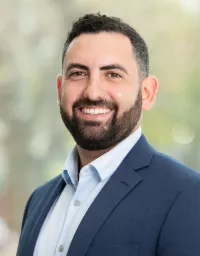Margot Kushel, MD
Professor of Medicine
Chief, Division of Health and Society
Director, Benioff Homelessness and Housing Initiative
Director, Action Research Center for Health
Dr. Margot Kushel is a Professor of Medicine and Division Chief at the Division of Health and Society at Zuckerberg San Francisco General Hospital and Trauma Center and Director of the UCSF Action Research Center for Health and UCSF Benioff Homelessness and Housing Initiative. Margot's research focuses on reducing the burden of homelessness on health through examining efforts to prevent and end homelessness and mitigating the effects of housing instability on health care outcomes. She uses a variety of research methodologies with an aim towards informing the development of programs and policies to end homelessness via understanding the complex interactions between health and housing. She has a particular interest in homelessness in older adults and homelessness in medically complicated individuals. She is the PI of an NIA funded R01 that developed the HOPE HOME (Health Outcomes in Populations Experiencing Homelessness in Older Middle agE) cohort, an ongoing longitudinal cohort study examining the causes and effects of homelessness on adults aged 50 and over in Oakland, CA. She is the PI of the California Statewide Study of People Experiencing Homelessness.
Margot is actively engaged in training and mentorship. She is the PI of a K24 award from NIA to mentor junior investigators in aging in historically marginalized populations. Margot works with diverse stakeholders to implement programmatic and policy changes based on her research. She maintains an active clinical practice at ZSFG in primary care internal medicine. Margot gives testimony at local and state levels and frequently speaks to the press about issues surrounding homelessness. Margot is a Board Member of Housing California and the National Homelessness Law Center.
Brie Williams, MD, MS
Professor of Medicine
Director, Amend
Associate Director for Policy, Action Research Center for Health
Dr. Brie Williams is a Professor of Medicine in the UCSF Action Research Center for Health and a physician trained in geriatrics and palliative care. She directs Amend at UCSF and co-directs the Aging Research In Criminal Justice Health (ARCH) Network. Her work focuses on transforming correctional culture to focus on the health of residents and staff, dignity and humanity, and on bringing the science of geriatrics and palliative care to criminal justice reform. She collaborates with colleagues from diverse disciplines (including criminal justice, public safety, and the law) to conduct impact-oriented research and education.
Dr. Williams' clinical research has called for improved responses to disability, cognitive impairment, and symptom distress in older or seriously ill incarcerated persons; a better understanding of the occupational health needs of prison staff; a more scientific development of compassionate release policies; and a broader inclusion of incarcerated people in national health datasets and in clinical research. Dr. Williams has served as a member of multiple national initiatives in the US, including the Workshop on Incarceration and Health sponsored by the Institute of Medicine and the National Academy of Sciences, and the Urban Institute’s Research in Penal Institutions. Her research has been supported by the Jacob and Valeria Langeloth Foundation, the Schusterman Family Foundation, Arnold Ventures, the National Palliative Care Research Center, the National Institute on Aging, the UC Office of the President, and the Cambia Foundation, among others.
Dr. Williams directs Amend, a training and leadership development program focused on giving correctional leaders, prison officers, and policymakers the tools needed to transform the toxic environments of many US prisons to instead focus more on health, dignity, and wellbeing. She is also a founding co-director of the Aging Research in Criminal Justice Network, funded by the National Institute on Aging, which has created a research network of over 200 academic and community members in the US working to expand research at the intersection of aging and criminal legal system involvement.
Dr. Williams has served as a consultant to jails, prisons, and legal organizations nationwide, including for the Federal Receiver of the California Department of Corrections and Rehabilitation and the National ACLU. She has participated as an expert witness in several lawsuits related to the health effects of solitary confinement. In 2016, Dr. Williams provided expert testimony to the US Sentencing Commission on proposed changes to Compassionate Release policies, recommendations which were later incorporated into the First Step Act.
Morgan Philbin, PhD, MHS
Associate Professor in Medicine
Associate Director, Benioff Homelessness and Housing Initiative
Director of Education Programs, Benioff Homelessness and Housing Initiative
Dr. Philbin is a social and behavioral scientist who uses mixed methods to examine how social policies and clinical practice shapes inclusion and health equity with a focus on substance use and HIV/AIDS. She has worked in the field of health disparities for over 15 years conducting research that explores how community-, institutional-, and state-level factors drive health outcomes among sexual and gender minority (SGM) young people and pregnant people. Dr. Philbin completed her MHS and PhD at the Johns Hopkins Bloomberg School of Public Health, and her Postdoctoral Fellowship in the Division of Gender, Sexuality and Health (HIV Center for Clinical and Behavioral Studies) at Columbia University.
She is Co-PI of a mixed-methods NIDA-funded R01 that is exploring the impact of general and pregnancy-specific opioid policies on substance use and substance use treatment engagement among pregnant people and their newborns. She is also PI of an R34 that is developing a patient decision aid to help minoritized women and providers choose between oral and long-acting injectable HIV medication. She is Co-I on multiple NIH-funded projects, including a COVID RADx grant focused on preventive behaviors among racial, ethnic and SGM youth, an R01 exploring how state-level social policies impact substance use outcomes for racial, ethnic and SGM youth, and two grants from the Canadian Institutes of Health focused on substance use, mental health and SGM individuals. She was recently awarded the 2021 NIH Office of Disease Prevention Early Stage Investigator Lecture Award for her work on HIV treatment and prevention.
Ryan Assaf, PhD, MPH
Assistant Adjunct Professor in Medicine
Dr. Ryan Assaf received his PhD and MPH in Epidemiology from the University of California, Los Angeles, Fielding School of Public Health and his BS in Public Health Sciences from the University of California, Irvine. During his graduate degree, Ryan’s research focused on sexual health, HIV/STIs, and substance use primarily among sexual and gender diverse groups. He recently completed his postdoctoral fellowship at the Benioff Homelessness and Housing Initiative, where his work centered on substance use, treatment, overdose, and harm reduction among people experiencing homelessness. Throughout his postdoctoral fellowship, Ryan presented data from the California Statewide Study of People Experiencing Homelessness at academic conferences, in scientific publications, and through op-eds-- one of which was published in the LA Times.
Ryan’s academic career stems from nearly a decade of working in community-based organizations, where he engaged in direct services and advocacy work for sexual and gender diverse communities, people who use drugs, and people experiencing homelessness. Ryan is currently working on a NIH K01 Mentored Research Scientist Career Development grant that will use data from the HOPE HOME and the CASPEH to evaluate the bidirectional relationship between substance use and homelessness. Ryan has a strong foundation in epidemiology and causal inference methodology and aims to further his academic career with DHES in policy-relevant work aimed at preventing and ending homelessness.




